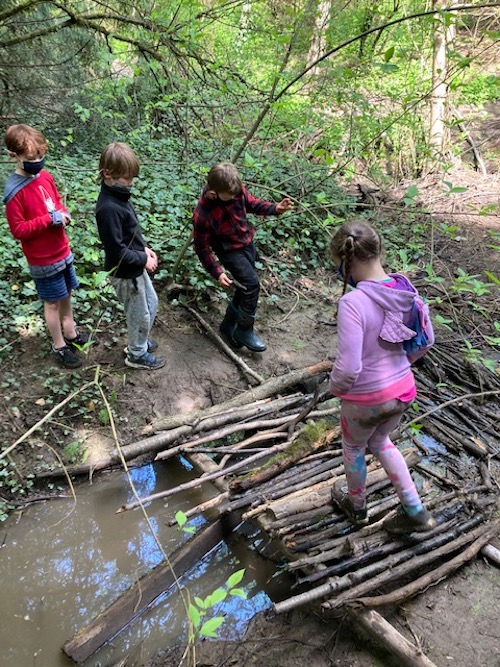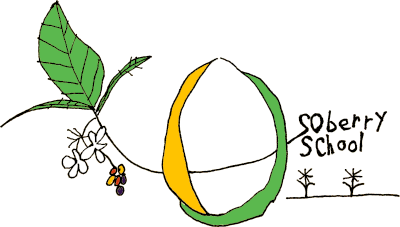How We Teach and Learn
Teachers at Osoberry School know best practices in teaching and utilize hands-on, experiential activities and project based units of study. We don't just teach foundational academics; we teach kids how to learn and nurture their innate curiosity and joy.
Each class follows a multi-year cycle of learning as they loop with their teacher. Math and Language Arts are taught in small groups based on skill development. By working in mixed-age classrooms, students are able to benefit from the experience of being a younger mentee and then an older mentor.
We follow an extended school year from September through July to give space and time to academics and personal interests. With extra days in the year we are able to approach academics deeply, give time for concepts to settle, and relax into a day that schedules in playful downtime.
Sample Schedule:
| Monday | Tuesday | Wednesday | Thursday | Forest Friday | |
|---|---|---|---|---|---|
| 8:30 | Arrive and Settle | Arrive and Settle | Arrive and Settle | Arrive and Settle | Meet at Park |
| 9am | Morning Meeting | Morning Meeting | Morning Meeting | Morning Meeting | Morning Meeting |
| 9:30 | Math Workshop | Math Workshop | Math Workshop | Math Workshop | Nature Exploration |
| 10:20 | Snack/Outside Play | Snack/Outside Play | Snack/Outside Play | Snack/Outside Play | Guided Activities |
| 11am | Literacy Block | Literacy Block | Literacy Block | Literacy Block | Nature Play |
| 12pm | Lunch/Gym Time | Lunch/Gym Time | Lunch/Gym Time | Lunch/Gym Time | Lunch |
| 1pm | Read Aloud | Read Aloud | Read Aloud | Read Aloud | Walk back to school |
| 1:30 | Theme Study | Choice Time | Theme Study | Choice Time | Choice Time |
| 2:30 | Jobs & Closing Circle | Jobs & Closing Circle | Jobs & Closing Circle | Jobs & Closing Circle | Jobs & Closing Circle |
| 3pm | Pick Up | Pick Up | Pick Up | Pick Up | Pick Up |
| 3-4:30 | Aftercare | Aftercare | Aftercare |
Curriculum Focus by Subject
Math
We use a combination of curriculums (Math for Love, Mindset Mathematics, Do the Math) and teacher-created lessons. We introduce and practice concepts using hands-on materials and math games to develop a concrete and flexible understanding of math concepts. Whenever possible we integrate art into our math study to connect with the creative, beautiful side of the subject.
We split students into small groups based on skill development to support each child where they're at. Because of that, students don't always work in their grade level. The following list gives you an idea of how we progress math skills through the years.
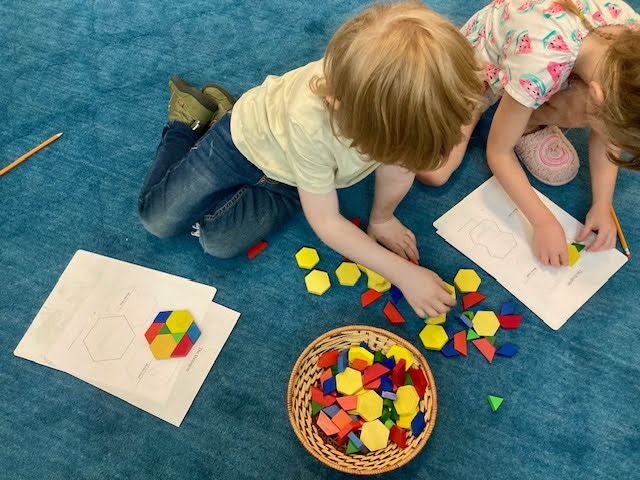
In Kindergarten, students typically focus on:
- Foundational skills in numeracy to build math flexibility
- Understanding the physical quantity of numbers
- Seeing and making patterns everywhere
- Putting numbers together
- Describing and sorting objects
- Stretching counting toward 100
In 1st/2nd grade, students typically focus on:
- Building a concrete and flexible understanding of numbers
- Developing a playful ease with addition and subtraction within 100, then 1000
- Building with and talking about shapes
- Using patterns in place value
- Using data to describe and wonder about the world
- Making and using equal groups
- Composing and decomposing numbers
- Measurement in time and space
In 3rd grade, students typically focus on:
- Continuing practice and fluency with addition and subtraction through 1000
- Learning and practicing multiplication
- Gaining a concrete understanding of division
- Working with basic fractions to understand equal parts
In 4th grade, students typically focus on:
- Mastery of multiplication/division in useful situations
- Play and practice with fractions including mixed fractions
- Introduction to decimals
- Using operations flexibly
- Building and designing with shapes and angles
In 5th grade, students typically focus on:
- Multiplying and dividing fractions
- Estimating with fractions
- Thinking in powers of 10
- Exploring the coordinate plane
- Using numbers and symbols flexibly
Language Arts
We use a combination of curriculums (Writing Workshop by Lucy Calkins, Brave Writer, Words Their Way Spelling, Handwriting Without Tears) and teacher-created lessons to build authentic and joyful uses of reading and writing. For students needing more focused reading/writing instruction we utilize Structured Literacy approaches in small group pull-outs. We combine our Language Arts lessons with thematic units in Social Studies and Science, and integrate the arts whenever possible as a mode for storytelling.
Just as in math, we split kids into small groups based on skill development. This means not all kids are working at their grade level. The following list will give you an idea of skill development through the years.
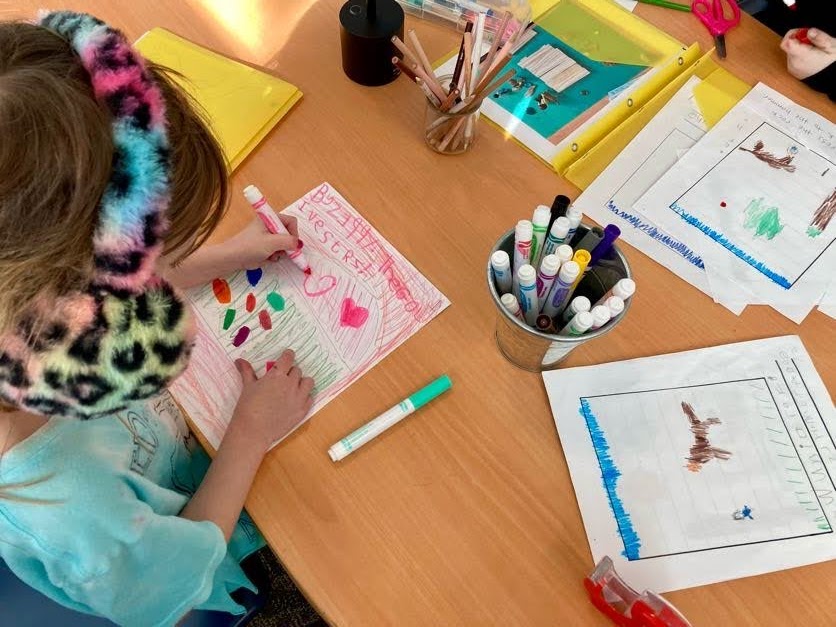
In Kinder-2nd grade, students typically focus on:
- Reading for joy
- Comprehension and discussion of read-aloud texts
- Exposure to a variety of texts including non-fiction, folktales, and poetry
- Developing and documenting made up stories, how-to books, and expert narratives
- Developing and practicing decoding skills, increasing in fluency from K to 2nd grade
- Practicing neat, legible printed handwriting
In 3rd/4th grade, students typically focus on:
- Reading for joy
- Reading a variety of texts including non-fiction, fiction, and poetry
- Developing research skills using printed and online materials
- Learning and practicing skills for book discussions
- Fluency in writing fictional and personal narrative stories, informational texts, and poetry
- Learning and practicing legible cursive script
In 5th/6th grade, students typically focus on:
- Reading for joy
- Engaging in deep discussions around philosophy, ethics, history, and current events
- Developing deeper skills in independent research
- Practicing presentation and public speaking
- Academic forms of writing such as essays in addition to deeper fiction writing
- Learning and practicing keyboard typing
Theme Study Projects
Our Theme Study Projects include Science, Social Studies, and Arts topics and are highly influenced by class interests. We use a combination of teacher-led and student-directed investigations to explore our world. We integrate language arts and math into our projects as a space for authentic learning.
Example projects include: Schoolyard ecology, mapping our city & Portland history, crime lab chemistry, First Nations of Oregon, animal reports, and class musicals
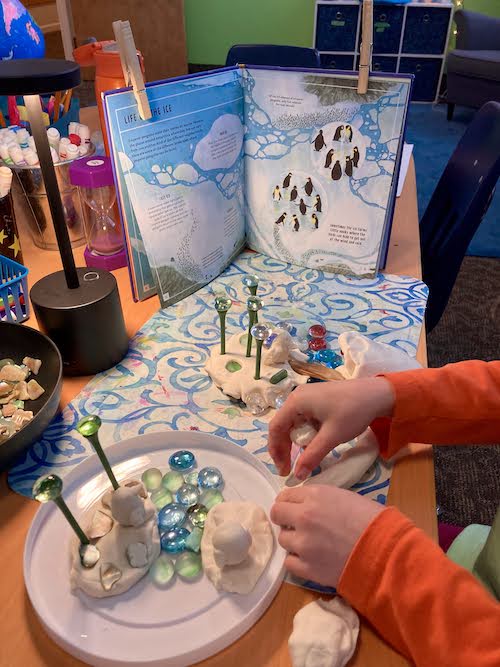
Art
We prioritize time for kids to work on creative art projects and explore different art techniques. Most of the time these projects are integrated into our academic work, but we also have special art specific lessons and materials are always made available during Choice Time for kids to explore. We carefully craft our art curriculum to teach skills progressively and expose kids to a variety of art mediums, techniques, and styles. We whole-heartedly believe that giving kids access to an arts-rich curriculum builds the emotional wellbeing of our students.
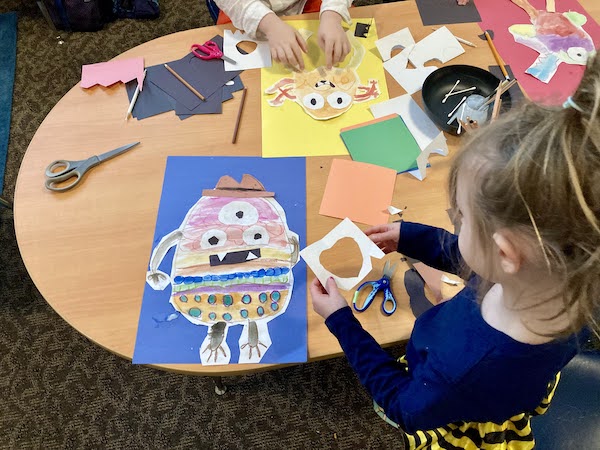
Forest Fridays
We utilize a slower pace on Fridays to engage in deep nature exploration. Typically we head to Laurelhurst Park (only two blocks from school) to play, explore, wonder, and learn. We have a mix of structured and unstructured time and often follow the lead of the children. We enjoy making nature crafts, diving into environmental science topics, and exploring engineering/physics.
With the help of parent drivers we are able to explore many of the amazing nature parks within the Portland Metro area and utilize local experts at organizations like the Audubon Center.
